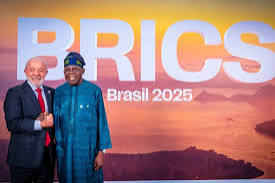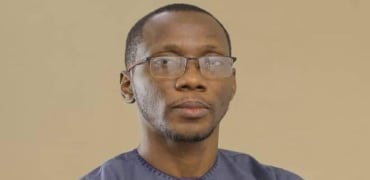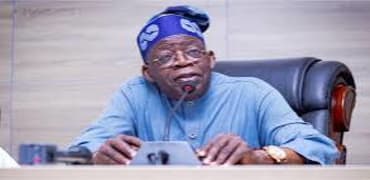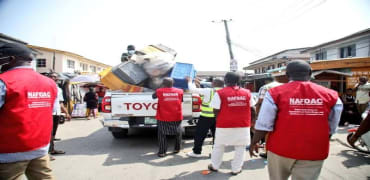Nigeria's BRICS Partner Status and Initial Gains
Nigeria's BRICS Partner Status and Initial Gains
By Tunde Rahman
President Donald Trump never ceases to amaze with his haughty and self-aggrandising governance style, endless huffing and puffing, brinkmanship, and tendency to weaponise America's often-stated exceptionalism and unilateralism.
Last weekend, as member states of the fledgling association of the Global South and a growing economic bloc, otherwise called BRICS, were holding their 17th Summit in the Brazilian city of Rio de Janeiro, Trump threatened to impose a fresh tariff hike on them, labeling the group a gang-up against America.
He warned that any country aligned with the policies of the BRICS alliance that diverge with US interests, would be hit with an extra 10% tariff. "Any country aligning itself with the anti-American policies of BRICS will be charged an additional 10% tariff. There will be no exceptions to this policy," Trump wrote on his Truth social media.
Trump's threat emerged after BRICS members criticised US tariff policies, proposed some reforms to the International Monetary Fund (IMF), and discussed how major currencies are valued. After the two-day meeting in Rio de Janeiro, BRICS Finance Ministers issued a statement criticising tariffs as a threat to the global economy. They noted that they have brought "uncertainty into international economic and trade activities."
Trump has always been disdainful of the BRICS since its formation. In 2024, he threatened 100% tariffs on BRICS countries if they moved ahead with their currency to rival the US dollar. After the association's recent meeting, he uttered the same threat, saying members of the group were out to de-legitimise the US dollar.
The BRICS nations must demonstrate unity of purpose in responding to President Trump. More than ever before, they need to be focused, act in unison, and continue to harp on their collective interest. It's just as expedient that BRICS members demonstrate they are driven by the need to get a fair deal for their countries within the international system, and that the association is by no means a gang-up against America.
BRICS was designed to enhance the member nations' economic interests and promote their international standing. This may be interpreted as a push against the US and Western Europe, but BRICS nations also have a responsibility to pursue and defend their interests.
In this context, one key advantage of BRICS nations is their large population, which translates to a bigger market. BRICS member states account for more than half of the world's population.
Last year, the list of BRICS member countries expanded beyond the original group of Brazil, Russia, India, China, and South Africa to include Egypt, Ethiopia, Indonesia, Iran, Saudi Arabia, and the United Arab Emirates. In January this year, Nigeria became BRICS' ninth partner country, joining Belarus, Bolivia, Cuba, Kazakhstan, Malaysia, Thailand, Uganda, and Uzbekistan.
Because of this partner-country status, President Bola Tinubu attended the 17th Summit of BRICS last week at the invitation of Brazilian President Luiz Inacio Lula Da Silva. The Nigerian leader arrived in Rio de Janeiro on Friday, July 4. The next day, July 5, he went into a bilateral meeting accompanied by some of his ministers and governors with the Brazilian leader and some of his cabinet members.
Along with the President, cabinet members, including Ambassador Yusuf Tuggar, Minister of Foreign Affairs; Senator Abubakar Kyari, Minister of Agriculture; Balarabe Abbas Lawal, Minister of Environment; and Idi Mukhtar Maiha, Minister of Livestock Development; and Mohammed Mohammed, Director-General of the National Intelligence Agency (NIA), participated in the summit.
State governors such as Hyacinth Alia (Benue), Prince Dapo Abiodun (Ogun), Babajide Sanwo-Olu (Lagos), Sheriff Oborevwori (Delta), and Mohammed Umar Bago (Niger) were also present at the bilateral talks.
During the meeting, President Tinubu informed his Brazilian counterpart, Lula Da Silva, that all bottlenecks hindering the agricultural sector's potential, including livestock production, would be removed to enhance food security and exports.
Noting that bureaucracy and administrative hiccups contribute to delays in realising the agricultural sector's well-acknowledged potential, the President disclosed that Nigeria was already undergoing reform to reposition the economy for global competitiveness, particularly in agriculture, where it already has a comparative advantage.
Discussions at the meeting centred mainly on agriculture, including livestock development, environment, aviation, trade and investment, and the Green Initiative, which designs climate-positive migration solutions for addressing climate change risks, market challenges, and innovation opportunities.
All the technicalities in actualising the agreements between Nigeria and Brazil, according to President Tinubu, will be streamlined and fast-tracked in areas of trade, aviation, energy transition, food and agricultural development, as well as mining and natural resources exploration.
President Lula, on his part, promised that all agreements with Nigeria would be regularised, and MOUs would be updated and signed without delay during President Tinubu's next visit to the country. He also pointed out that the lingering bureaucratic delays between the two countries would be removed for quick results.
Brazil has recorded tremendous achievements in research and development. The country is easily regarded as one of the top global producers of food and other agricultural products. President Tinubu's visit demonstrates Nigeria's readiness to establish a strong partnership with Brazil to tap into this feat to stimulate growth in food production and animal husbandry.
However, on Sunday, July 6, while addressing the BRICS summit, President Tinubu restated his position on global trade, international financing, climate change, and healthcare, as well as his belief in and support for BRICS. The President advocated a re-evaluation of the current global financial system and healthcare distribution, calling for more consideration, equity, and inclusion for the poor and emerging economies, particularly in Africa.
According to President Tinubu, environmental degradation, climate crisis, and inequalities in the healthcare system deserve more attention, as they contribute to hindering growth and development in Third World countries.
At the Summit, President Tinubu affirmed Nigeria's support for the position of BRICS on the need to focus on collective, fair and equitable global development. "Nigeria, therefore, associates with what I have heard here today, and all that has been taking place in BRICS. The next issues are financial restructuring and re-evaluation of the global structure," he told the BRICS member–states, pointing out that environmental deprivation, climate crisis, and global healthcare inequalities were shared concerns pertinent to Africa.
"Africa has contributed the least to global emissions but suffers the most," the President said, adding: "The African continent is creating the path through the African carbon market initiative and the Great Green Wall. We believe that eventually, COP-30 will strengthen our resolve to embrace a healthy global environment strategically."
Nigeria, the world's sixth-most populous country and one of Africa's major economies, undoubtedly shares convergent interests with other BRICS members.
President Tinubu affirmed this much: "Nigeria strongly believes in South-South cooperation. We can, therefore, not be passive participants in global decision-making. So, issues such as financial restructuring, debt forgiveness, climate change, environmental ruin, and global healthcare must be resolved. We must be the architects of a future that addresses the specific needs and concerns of youths, who represent 70 per cent of our population in Nigeria. Therefore, Nigeria remains guided by our long-term vision, 2050, and nationally determined contribution.
"We are taking bold steps to accelerate renewable energy adoption, mainstream climate action, promote nature-based solutions, strengthen urban resilience, champion South-South cooperation, align with global renewal framework and achieving universal health coverage for all."
It is instructive that President Tinubu has used every opportunity on the international scene to demand an equitable global trade, accessible financing, sustainable technology transfer, and climate justice. He canvassed the same issues while addressing the 78th United Nations' General Assembly in New York in September 2023, at UN Climate Change Conference, otherwise called COP28 in Dubai, United Arabs Emirates, in January 2024 and at the 19th Summit of the Non-Aligned Movement in Kampala, Uganda, also in January 2024, where he was represented by the Minister of Budget and Economic Planning, Senator Atiku Bagudu, among other international forums.
Indeed, the gains of attending the recent BRICS Summit and President Tinubu's friendship with President Da Silva are already manifesting in many respects. Firstly, on the heels of President Tinubu's visit to Brazil last year, Brazil's Vice President, Geraldo Alckmin, visited Nigeria this year to build on the agreements reached between Presidents Tinubu and Da Silva, particularly on the Green Initiative.
Secondly, on the sidelines of the 17th BRICS summit, the Managing Director of Nigeria's Bank of Agriculture, Ayo Sotinrin, met with his counterpart from Brazil, where he was informed that President Lula had given a firm directive to Brazilian agricultural institutions and companies to invest heavily in Nigeria.
Even back at home, the impact has been no less.
On June 25, 2025, the Presidential Implementation Committee on Technology Transfer represented by Dr. Dahiru Mohammed officially signed a strategic partnership agreement with Brazil's renowned Campos Group to provide technical expertise for the Irrigate Nigeria programme.
For some years now, agriculture has been among the highest contributors to Nigeria's GDP. This collaboration is thus a big boost for Nigeria's quest to strengthen the agricultural value chain and reduce import dependency through large-scale technology-enabled farming. Campos Group, known for its central role in Brazil's agricultural revolution under the PRODECER Programme, brings over four decades of expertise in developing irrigated agricultural zones and transforming previously under-utilised lands into thriving agro-industrial hubs.
There is much more. But to further reinforce these agreements and consolidate the initial gains, signing a Bilateral Aviation Safety Agreement (BASA) between Nigeria and Brazil has become imperative. This is an ample pathway to bilateral cooperation in various aviation areas, including maintenance, mutual flight operations, and environmental certification. We can glean from the foregoing what a full membership of BRICS would yield for Nigeria. Notwithstanding President Trump's misguided threat, it will help the country reap the full benefits of associating with the group.
-Rahman is Senior Assistant to President Tinubu on Media & Special Duties.



















